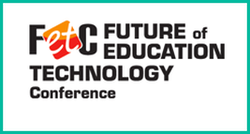
In the following interviews, two of the featured presenters in this content track provide a variety of insights into the ever-evolving world of assistive technology. Tech has been a significant factor in supporting students’ needs, but best practices quickly require updating and proper implementation strategies must be in place to make the most of these tools. Based on many years of experience, the interviewees share what has worked for them and what’s around the corner.
Kindy Segovia, Supervisor of Special Education Instructional Resources for the Kent Intermediate School District in Grand Rapids, Mich., has been a featured presenter at FETC for a number of years. This year, she’ll be talking about access, removing barriers, and the use of assistive technology.
In this interview, you’ll hear about the positive changes she’s observed in recent years: "We're finally starting to see some implementation of moving beyond—especially in the world of assistive technology—the one-student, one-solution strategy that we've adopted and implemented for a long time."
Segovia adds, "We're trying to find tools and strategies that meet the needs of more students, if not all students. [We are looking] not just to assist the classroom teacher but make system-wide change. While that can be daunting and difficult, we are starting to see that trend have a little bit of an upswing.”
Gauging the Growth of Assistive Technology
In this conversation with Patrick Turnage, Assistive Technology Coordinator at the Florida School for the Deaf and the Blind, you’ll hear how he has applied his direct understanding of students’ needs to his actions as an educator. Turnage, who has congenital glaucoma, was born legally blind with limited vision and became fully blind by eighth grade. He recognized early on that the only way to accept and adapt to his reality was to become a lifelong learner, and technology gave him the ability to learn and communicate freely.
Turnage says, "One of the things that makes me want to come to work every day is [being] a grownup in an environment that is the same as my students. I recognize the value being visually impaired allows me to bring to my job every day. It allows me to understand what my students need and how I can help them. The technology skills I work with them on are the same technology skills I go home to and depend on in my daily life to accomplish everyday tasks."
Visit edCircuit for more interviews with more FETC 2020 presenters












